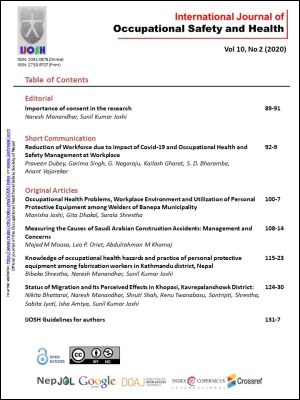Status of Migration and Its Perceived Effects in Khopasi, Kavrepalanchowk District: A Descriptive Cross-Sectional Study
DOI:
https://doi.org/10.3126/ijosh.v10i2.33362Keywords:
Attitude, Effect of migration, Families left behind, Migrant workersAbstract
Introduction: Labor migration has become a means to make ends meet for low-income countries. It plays a key role to provide employment opportunities and has helped in the improvement of the standard of living. With the alarming rise of migrating workers, it becomes important to acknowledge the effects of migration on both the migrant workers in the destination country as well as families left behind at the place of origin. The objective of this study was to find out the status of migration of population in Khopasi village and their attitude towards the effects of migration on families left behind.
Methods: A descriptive cross-sectional study was conducted among 256 residents of Khopasi, Kavrepalanchowk district from 10-15th November 2019. Participants were interviewed using a semi-structured questionnaire to assess the status of migration of immediate family members as well as the attitude towards migration and its effects.
Results: The prevalence of migrant workers was 39.8%. The process of migration was assisted by their migrated relatives 59 (19.1%) and by foreign employment agencies 30 (12.92 %). The expenses for migration were managed by bank loan 34 (33.34%). Among102 migrant workers, 54(52.9%) are still working abroad whereas 48 (47.1%) have returned to Nepal. The main reason for migrant workers to go abroad was unemployment 59 (57.8%) in Nepal. Out of 102 who migrated, most of them 39 (38.23%) have spent 1-3 years abroad while 76 (68.6%) send remittance regularly to their family members at home around 1-3 lakhs/year. Among all the migrant worker 37(36.27%) reported some form of disease and disability. There was a positive attitude toward family and the country’s economy but the overall attitude towards migration was negative.
Conclusion: In this study, remittance sent by migrant workers to their families was not adequate as there were no visible financial benefits and negative health consequences were also present. There are other impacts of migration like broken families, separation, difficulty in the rearing of children, mental health of elderly were seen on the families left behind. Various studies are required to further analyze the impact of migration other than remittance.
Downloads
Downloads
Published
How to Cite
Issue
Section
License
Copyright (c) 2020 Nikita Bhattarai, Dr, Naresh Manandhar, Dr, Shruti Shah, Dr, Renu Twanabasu, Dr, Santripti, Shrestha, Dr, Sabita Jyoti, Dr, Isha Amtya, Dr, Sunil Kumar Joshi, Prof

This work is licensed under a Creative Commons Attribution-NonCommercial 4.0 International License.
This license enables reusers to distribute, remix, adapt, and build upon the material in any medium or format for noncommercial purposes only, and only so long as attribution is given to the creator.





